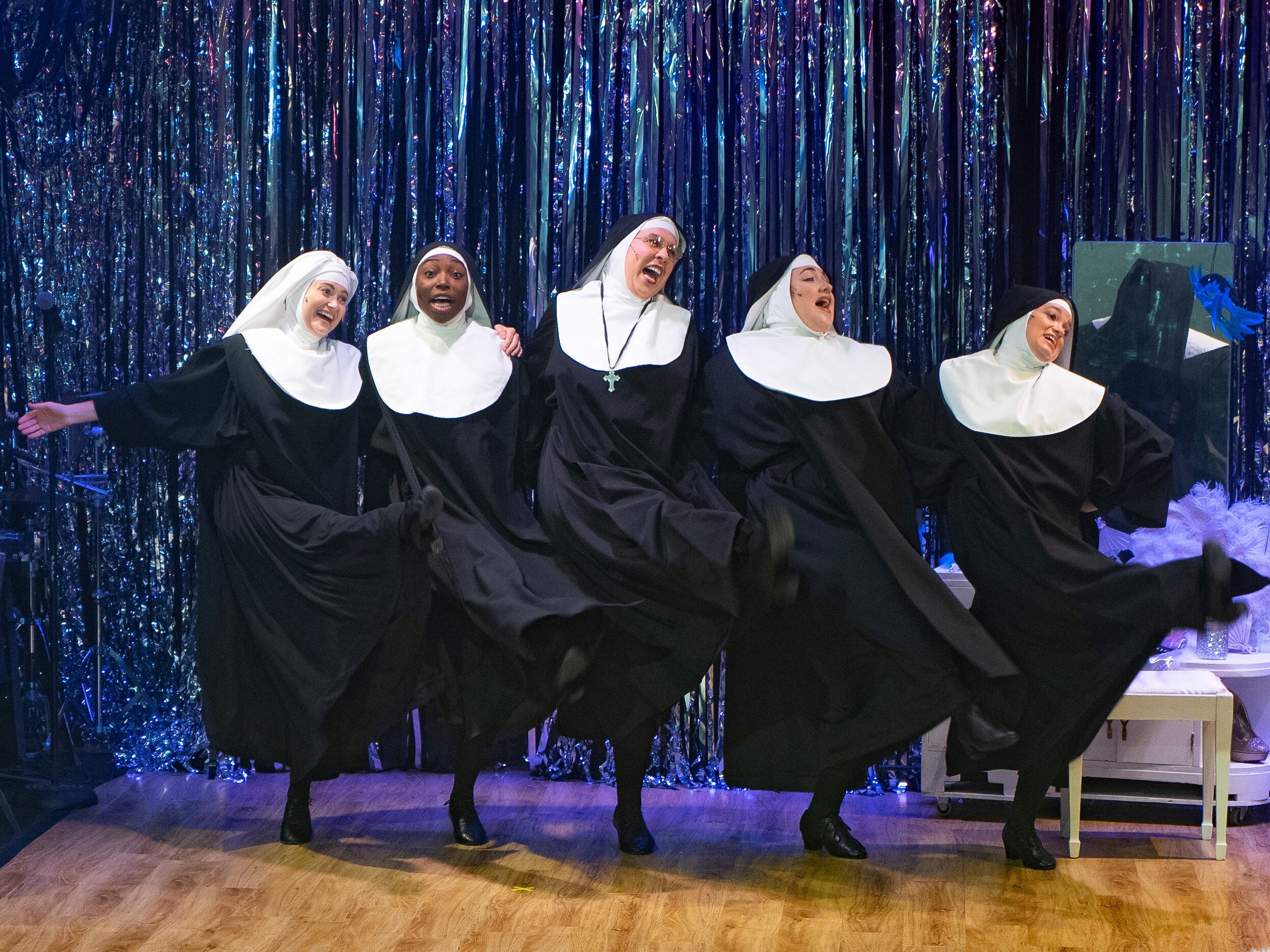Review of Nunsense, Playhouse on Park
What lends charm to Dan Goggin’s venerable Nunsense after all these years is how refreshing it is to see a musical that, while unabashedly silly, is full of affection for the schtick of musical revues. The invigorating notion that “anyone can put on a show”—that everyone has intuited the forms of Old School musical comedy, even a group of nuns—is the conceit that drives the show’s machine. And it works!
Reverend Mother Superior, Sister Mary Regina (Amanda Forker) and the remaining nuns of the Little Sisters of Hoboken are in a fix: botulism in the vichyssoise prepared by Sister Julia, Child of God has killed all the other Sisters and all but four have been buried. Now money must be raised to inter the four stored in the convent’s freezer before a health crisis ensues. The solution: sing and dance and earn the needed cash. Anyone who has ever been associated with a school or religious organization knows that fund-raisers are part of the calendar. Here, there’s much appeal to the Appeal.
Sister Mary Leo (Rachel Oremland), Sister Mary Hubert (Brandi Porter), Sister Mary Regina (Amanda Forker), Sister Robert Anne (Lily Dickinson), Sister Mary Amnesia (Hillary Ekwall) in Playhouse on Park’s Nunsense, directed by Darlene Zoller (photos by Rich Wagner)
The humor in seeing a fivesome of nuns assay tap and ballet and Ethel Mermenesque belting may well be a matter of simple incongruity, but what Goggin—who was once a seminarist before performing in and then writing for theater—gets is how quirky the ladies of the habit can be. Each has her plausible skill or gripe or affliction—such as the faulty memory of timid Sister Mary Amnesia (Hillary Ekwall), or the ambition of tetchy Sister Mary Hubert (Brandi Porter) to be Top Nun, or the dream of sweet-faced novice Sister Mary Leo (Rachel Oremland) to be a ballerina, or the way brassy Sister Robert Anne (Lily Dickinson) of Canarsie asserts her stage-readiness at every opportunity.
Then there’s the Reverend Mother herself: with a background in carnival and a quirky sense of humor, her reign is full of the tics of idiosyncratic authority. And when she samples a bit of confiscated “Rush” (a form of amyl nitrate) she goes off on a gleefully slapstick bender that just gets weirder and weirder. Forker shows off the comedic skills she put to use in Say Things Funny, a tribute to Carol Burnett—the great TV comedienne of whom her routine is uproariously reminiscent. It’s a madcap, show-stopping set-piece that is both entertaining and unsettling.
Sister Mary Hubert (Brandi Porter), Sister Mary Regina (Amanda Forker)
The songs are peppy and showcase the cast’s skills, particularly Porter’s soulful rendition of “Holier Than Thou,” and Ekwall doubling herself with a fractious hand-puppet, Sister Mary Annette, while hitting angelic notes in “So You Want to Be a Nun.” The harmonizing on “Just a Coupl’a Sisters” between Porter and Forker seems natural and unforced. A certain kind of too-show-bizzyness could be the sin that would sink this show, but the cast, directed by Darlene Zoller, avoids the temptation. There’s a DIY aspect to the show that suits it, including patter with the onstage band featuring two players in school uniforms. The set, supposedly a school gym, bears the requisite basketball court markings, and also the left-over set from the previous show—a swing and divan and a vanity for strippers.
The nuns are engaging and fun to spend time with, working the crowd, encouraging interaction and—as nuns are wont to do—imposing quizzes. The backstory about a mission of mercy to an island of lepers goes by quite quickly (thankfully) early on, then Sister Mary Amnesia asks us about the details we remember, which leads to her sweetly earnest awarding of prizes to lucky audience-members. At times the show’s jokes can be a bit dated—Sally Fields and plays on the names of classic shows, and, by Dickinson, impressions of famous divas such as Cher and Katherine Hepburn—but they’ll land for audiences with a sense of the past, such as variety shows of the ‘70s.
Nunsense kicks off Playhouse on Park’s eleventh season, a season aimed to “focus on universal stories that give women a voice.” The voices here are lively and, if a bit clichéd, well, that comes with the territory Goggin is covering. It may help to have been in the company of nuns at some point in one’s life to get the show’s full effect (I was for my first 8 years of education and the pews and statuary, chalices and censers in the lobby help set the mood), but the only necessary prerequisite to enjoying this easygoing show is a willingness to be entertained. And you will be—saints be praised!
Nunsense
A Musical Comedy
Book, Music and Lyrics by Dan Goggin
Directed by Darlene Zoller
Music Director: Melanie Guerin; Scenic Designer: Johann Fitzpatrick; Sound Designer: Joel Abbott; Lighting Designer: Shane Cassidy; Costume Designer: Lisa Ann Steier; Choreographer: Darlene Zoller; Stage Manager: Mollie Cook; Props Artisan/Set Dresser: Eileen O’Connor
Cast: Lily Dickinson, Hillary Ekwall, Amanda Forker, Rachel Oremland, Brandi Porter
Band: Melanie Guerin, conductor, keyboard; Elliot Wallace, drums; Mallory Kokus, reeds; Phoebe Suzuki, violin
Playhouse on Park
September 18-October 13, 2019






